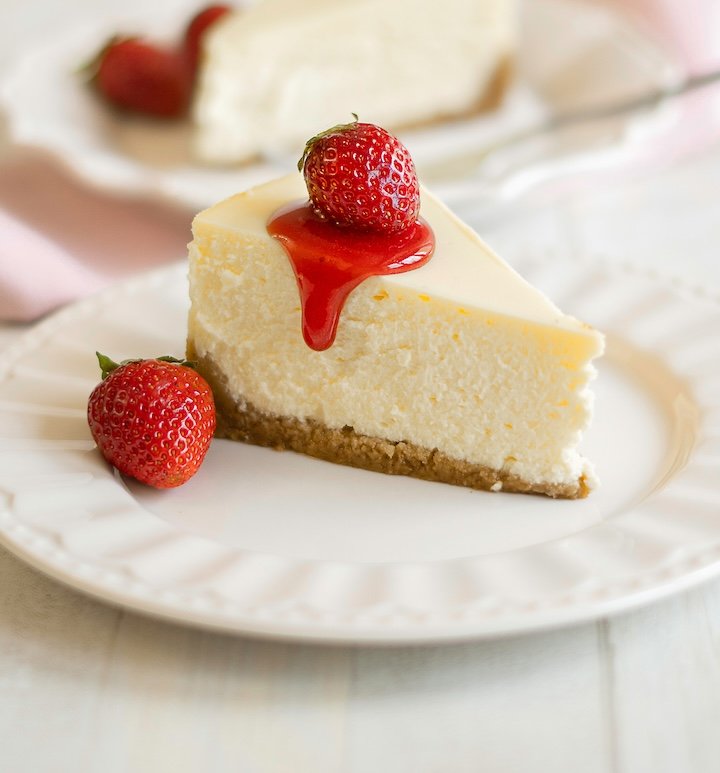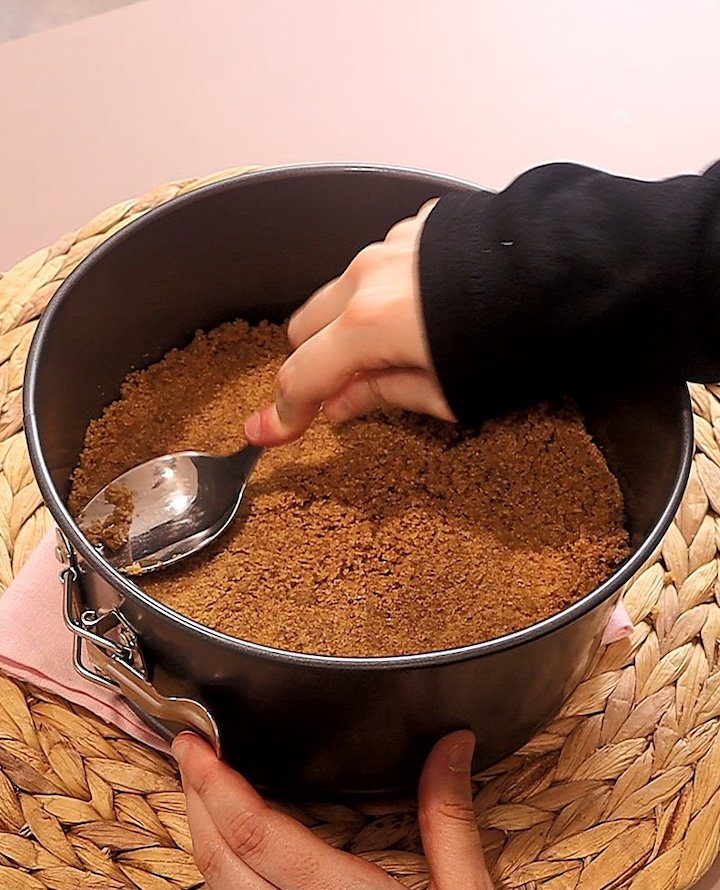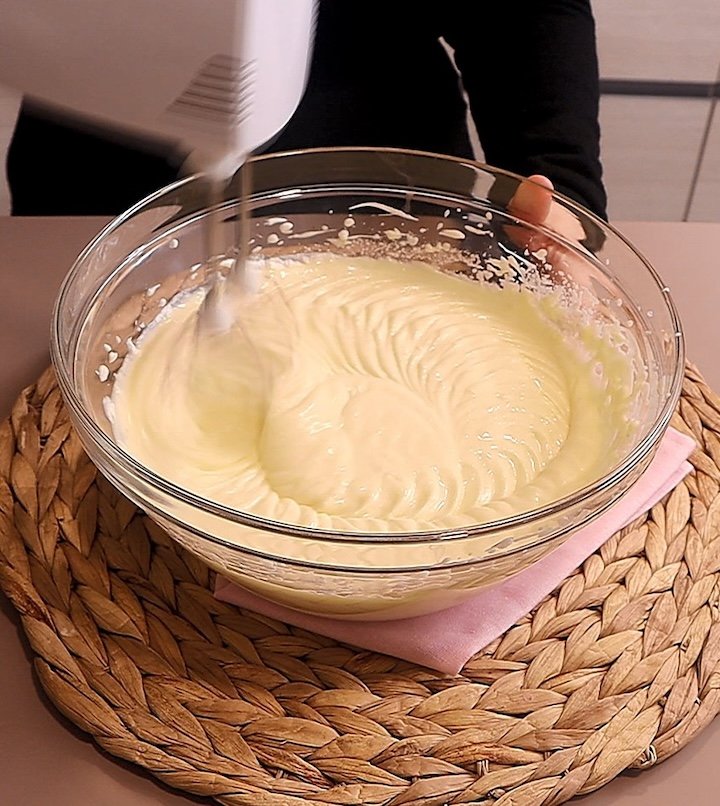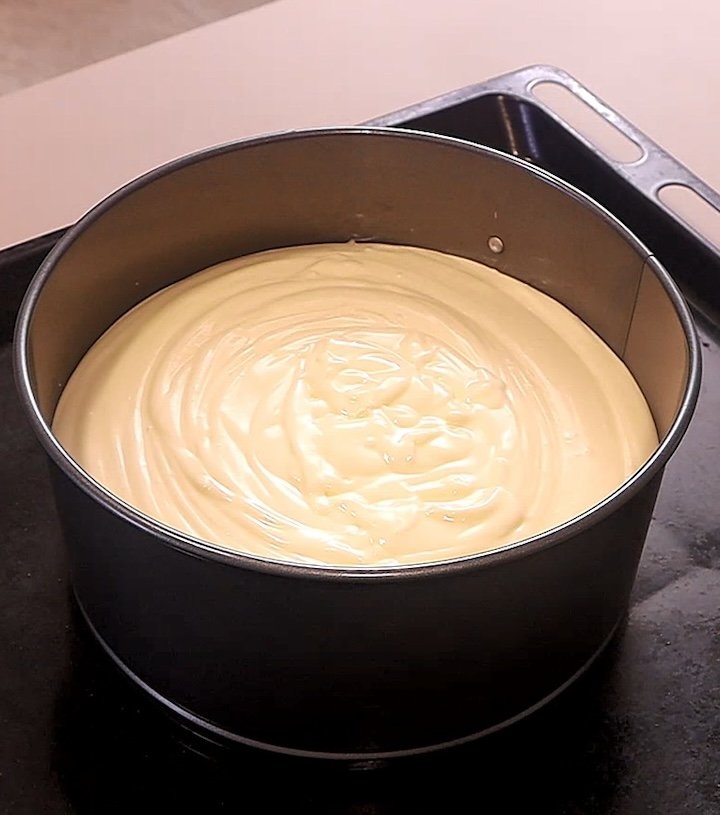Emma Fontanella’s Easiest New York Style Cheesecake
About My Easiest New York Cheesecake
For me, a classic New York cheesecake is the platonic ideal of what cheesecake should be. It’s dense, rich and creamy with a delicious crunchy base. This easy, but authentic version will add a taste of New York to any dining table, and makes a fantastic family dessert. You can make this cheesecake well ahead of time, so it’s also great as part of a celebration meal where you have lots of other cooking to do on the day.
My version doesn’t need a water bath like most recipes do, so it really is super easy to make. I think it’s one of the best cheesecakes you’ll ever have. Here’s the recipe, along with all the tips you need to achieve a perfect smooth and creamy texture, with no cracks ever!
This recipe can be found in my new cookbook, Simple Pleasures. In the book, you find plenty of other easy cake recipes to enjoy, including no-bake mini cheesecakes, vanilla tres leches cake, coffee crumb cake, and one-bowl lemon pound cake.
Why do baked cheesecakes crack?
Rapid increases or decreases in temperature can both make proteins in the eggs coagulate and shrink, and also cause air in the mixture to expand or contract. Both of these factors create stresses in the structure of the cake, resulting in cracks. Additionally, if the cheesecake is over baked, it can dry out and crack.
How do you make a cheesecake without cracks?
The main secret to making a cheesecake without cracks is gentle, gradual heating and slow cooling; but there are other things you can do. Here are three pasty chef secrets for preventing your cheesecakes from cracking (we do all of these things in this recipe, which means we don’t need to use a water bath when baking this cheesecake):
First, add a little starch (e.g., all-purpose flour) to the cheesecake filling mix. This stabilizes the proteins in the eggs, helping to stop them shrinking and causing cracks to form.
Second, use room temperature ingredients. This allows you to mix the ingredients for the filling quickly. The shorter the time you spend mixing, the less air you’ll incorporate into the filling, the less likely your cheesecake is to crack as it bakes.
Third, to prevent your cheesecake from drying out and cracking, turn off the heat when the center is still wobbly and allow it to cool in the oven. It will continue to cook gently for a while after you turn the oven off, giving you a perfect end result.
How long does cheesecake last in the fridge?
Cheesecake will last up to 3 days in the fridge. Make sure to keep it covered, and take it out of the fridge and let it warm up a little for around an hour before you want to serve it. Add any toppings, for example strawberry sauce, just before serving.
What is a New York cheesecake?
A slice of Emma Fontanella’s New York Cheesecake, topped with strawberry sauce and a fresh strawberry.
New York cheesecake is a type of baked cheesecake with a dense creamy texture. The filling is is made with Philadelphia cream cheese, sugar, and eggs, along with with sour cream or heavy cream. It’s the sour cream or heavy cream that gives New York Cheesecake its iconic flavor and texture.
Why is New York cheesecake the best?
What makes New York Cheesecake the best is its dense creamy, texture—it’s so deliciously smooth on the palette. It’s also a great example of flavor restraint. It’s just sweet, tangy and rich. No strong flavors are added—no lemon or lime, no chocolate or ginger. That makes it delicious on its own, but also makes it the perfect complement to the toppings of your choice.
What is the difference between New York style cheesecake and regular cheesecake?
The differences between New York style cheesecake and regular cheesecake are about taste and texture—New York cheesecake is richer and creamier. A traditional, regular baked cheesecake is made using just cream cheese, eggs and sugar. The kind of cheese can vary, but is often ricotta or mascarpone. New York cheesecake has a couple of differences. First, the cheese is almost always Philadelphia cream cheese. Second, the recipe adds sour cream or heavy cream, and it’s this that really makes the difference to the taste and texture New York cheesecake.
EQUIPMENT
8-inch (20cm) springform pan
Handheld or stand mixer
Offset spatula (not required, but recommended)
INGREDIENTS
FOR THE CRUST
5½ tablespoons (80g) unsalted butter, melted
5oz (150g) graham crackers, about 10 graham crackers. Or optionally, the same quantity of digestive biscuits.
FOR THE FILLING
27oz (750g) Philadelphia cream cheese, at room temperature
¾ cup (150g) sour cream, room temperature
1 tbsp vanilla extract
1 cup (200g) granulated white sugar
3 medium eggs, at room temperature
3 tbsp (30g) all-purpose flour
¼ tsp salt
TOPPING
Fresh strawberries and strawberry sauce (optional), to serve
INSTRUCTIONS
Preheat the oven and prepare the pan
Preheat the oven to 300°F (150°C).
Lightly grease the interior of an 8-inch (20cm) springform pan with butter, coating the bottom and sides. Line the base of the pan with a circle of parchment paper and place the pan on a baking sheet.
I like to flip the base over and use it “upside down” in the assembled pan. That way, you won’t have a ridge on the inside of the base. Doing it this way, makes it easier to slide the cheesecake off the base when it’s finished.
Prepare the crust
Mixing crushed Graham crackers with melted butter for the cheesecake base
In a medium, microwave-safe bowl, microwave the butter until melted. Put the graham crackers or the digestive biscuits in a zip-top bag and crush them to a fine texture with a rolling pin. Add the crushed graham crackers to the butter and stir to combine.
(Personally, I prefer to use digestive biscuits for cheesecake bases. I think the flavor works better. It’s really worth trying them, if they’re available where you live).
Form the crust
Forming the cheesecake base in the pan
Transfer the butter/crumb mixture into the prepared springform pan. Using the back of a tablespoon, distribute and press the crumb mixture to form an even layer on the bottom of the pan.
Make the filling
Beating the cream cheese, sour cream and vanilla extract.
In a stand mixer fitted with a paddle attachment (or a large bowl, if using a hand mixer), beat the cream cheese, sour cream, and vanilla on medium speed until smooth, about 30 seconds.
With the mixer running at low speed, add the sugar in a stream. Increase the speed to medium and continue beating the mixture for about 1 minute until it looks uniform.
Add the eggs one at a time, beating the mixture to incorporate each egg before adding the next. As soon as the eggs are incorporated, stop mixing.
Finishing mixing the cheesecake filling.
Add the flour 1 tablespoon at a time and then the salt, continuing to beat on medium-low speed until incorporated.
Scrape the bowl and mix again
Using a rubber spatula, scrape the bottom and sides of the bowl. The cream cheese will settle at the bottom of the mixer, so it's important to scrape the bottom well to avoid streaks in your cheesecake. Give one last mix on low speed for about 20 seconds.
Assemble the cheesecake
The assembled cheesecake, ready for baking.
Transfer the cheesecake filling onto the prepared crust. Smooth the surface of the filling using an offset spatula. Gently tap the pan on the countertop a few times to release any air bubbles that might have formed.
Bake and cool the cheesecake
Bake for 1 hour. The edge of the cheesecake should be set, but the center should wobble when you give the pan a nudge. Turn the oven off and leave the cheesecake in the oven with the door closed for 20 minutes.
Then, open the oven door and allow the cheesecake to sit for another 10 minutes.
Finally, carefully remove the cheesecake from the oven and allow to cool completely in the pan at room temperature. When cool, cover with a plate, and refrigerate for at least 8 hours or ideally overnight.
It’s important that you let the cheesecake cool completely, before putting it in the fridge. If you don’t your cheesecake is likely to “sweat”… and no one wants a sweaty cheesecake!
Serve
Slicing the baked cheesecake
Gently run a knife around the edge of cheesecake to release it from the sides of the pan. Remove the cheesecake from the pan and place on a serving plate.
Cut into slices and serve with fresh strawberries and a little strawberry sauce, if desired.
A slice of the finished cheesecake
Watch the video for more tips
Hi! I’m Emma Fontanella. Here you’ll find trusted, tested recipes to satisfy your baking addiction and carb cravings. Learn more…
Tried one of my recipes? Please let me know on Instagram (@emmafontanella) or TikTok (@emma.fontanella)! Hashtag #emmafontanella
Search for another recipe…











